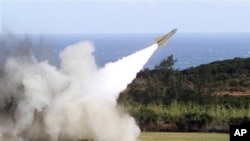Taiwan has tested several missiles, just as China’s president heads off to visit the United States. Although the island’s government has worked to improve relations with Beijing in the past two years, the test is seen by some as a political statement.
Seventeen missiles were fired at an air base in southern Taiwan on Tuesday morning as President Ma Ying-jeou watched. At least five missed their targets, disappointing the president, but defense official say that was within normal range.
The tests took place on the day China’s President Hu Jintao left for a state visit to the United States, and follow China’s test last week of an aircraft said to have stealth technology.
In addition, Taipei has recently renewed its request to buy new F-16 fighter jets from Washington.
Hsu Yung-ming, a political scientist at Soochow University in Taipei, says that as Taiwan prepares for the presidential race next year, it must appeal to the United States for the F-16s, especially after China's aircraft test that shows possible air superiority over the island. He says the decision as important as when to hold a major drill cannot be a coincidence.
Beijing claims sovereignty over Taiwan, which has been self-governed since 1949. Over the past two years, Ma has sought to improve ties with Beijing, with a series of agreements opening up more trade and tourism across the Taiwan Strait.
But that has anger many Taiwanese voters who do not favor closer ties with China. And many political analysts expect Ma to seek re-election next year.
Taiwan has asked the United States since 2007 for new F-16 fighter jets to help defend the island from China's military. U.S. officials say they are still open to selling advanced arms to Taiwan.
But Washington also wants to get along with economic powerhouse China, which fumes whenever sales to Taiwan are approved. The Chinese cancelled military exchanges and expressed its anger for weeks after the United States approved a $6.4-billion arms package for Taiwan a year ago.
Last week, military ties between China and the United States appeared to be improving, after U.S. Secretary of Defense Robert Gates visited Beijing.
Taiwan Tests Missiles Ahead of China-US Meeting




